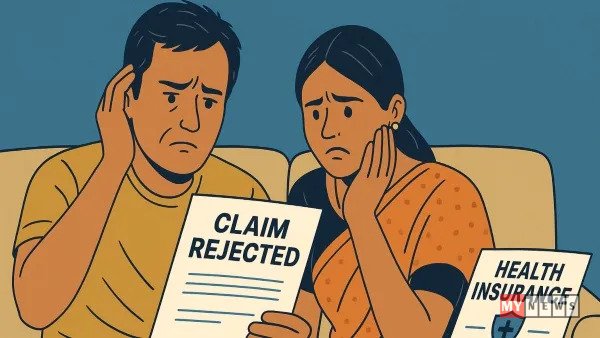Eye-catching advertisements promising a secure future through health or life insurance often skip one crucial truth — insurance claim rejections are sharply rising across India. According to the Insurance Regulatory and Development Authority of India (IRDAI), insurers rejected health insurance claims worth ₹15,100 crore in FY 2023–24, exposing a growing trust gap between policy promises and payouts.
For many, a claim rejection feels like betrayal — especially when it happens due to minor paperwork errors or incomplete records. But policyholders are not helpless. India’s insurance framework gives every consumer the right to challenge invalid claim rejections and demand fair treatment under the law.

🧾 Why Do Insurance Claims Get Rejected?
Insurance companies often cite reasons such as incomplete documentation, discrepancies in medical records, or non-disclosure of pre-existing conditions. While some of these reasons are valid, a significant number of rejections stem from technical errors, vague policy terms, or lack of communication between hospitals and insurers.
Experts advise that before taking legal action, policyholders should contact their insurer directly to understand the exact reason for rejection and provide any missing information. If the insurer refuses to cooperate or gives an unsatisfactory response, the next step is to approach the Insurance Ombudsman — a free, government-backed dispute resolution body.
⚖️ Who Is the Insurance Ombudsman?
The Insurance Ombudsman, also known as Bima Lokpal, was established by the Government of India to provide a simple, fast, and free alternative to the lengthy court process. The Ombudsman’s primary role is to resolve disputes between policyholders and insurance companies regarding insurance claim rejections, policy delays, or mis-selling of policies.
Currently, there are 17 Ombudsman offices across India, each covering specific regions. The process does not require hiring a lawyer — making it accessible for common citizens. The Ombudsman’s decisions are binding on insurers, ensuring accountability and faster resolutions.
👥 Who Can File a Complaint?
Any policyholder, nominee, legal heir, or assignee can file a complaint. However, it must be submitted to the Ombudsman office that corresponds to the complainant’s residential area.
Importantly, insurance agents or brokers cannot file complaints on behalf of clients — the complaint must come directly from the policyholder or an authorized representative.
📝 How to File a Complaint Against Claim Rejection
Filing a complaint is simple and free:
- Identify your local Ombudsman office from the official portal www.cioins.co.in.
- Draft a written complaint explaining your issue clearly — include your policy number, claim ID, insurer’s name, and reason for rejection.
- Attach copies of rejection letters, policy documents, and supporting medical or financial records.
- Submit your complaint by post, in person, or online through the official portal.
After submission, you’ll receive an acknowledgment with a case reference number. The Insurance Ombudsman will review the case, possibly mediate between you and the insurer, and aim to resolve it within three months.
If the Ombudsman rules in your favor, the insurer must comply. However, if you’re not satisfied, you still retain the right to approach consumer court for further appeal.

💡 Tips to Avoid Future Claim Rejections
- Always disclose pre-existing medical conditions honestly when buying insurance.
- Keep all medical, hospitalization, and payment records safely stored.
- Submit claims within the time limits mentioned in your policy.
- Check all policy details, nominee names, and coverage terms carefully.
- Maintain written communication with your insurer and save copies for reference.
📊 Final Takeaway
A rejected insurance claim doesn’t mean your journey ends. By understanding the process and using legal rights effectively, policyholders can challenge insurance claim rejections and secure their rightful settlements. The Insurance Ombudsman remains one of the most powerful tools for ordinary citizens seeking justice — without spending on lengthy court battles.
Knowledge, transparency, and persistence are the keys to winning against unfair rejections — and ensuring that your insurance truly protects you when you need it the most.
Disclaimer: The views and recommendations expressed are solely those of the individual analysts or entities and do not reflect the views of GoodReturns.in or Greynium Information Technologies Private Limited (together referred as “we”). We do not guarantee, endorse or take responsibility for the accuracy, completeness or reliability of any content, nor do we provide any investment advice or solicit the purchase or sale of securities. All information is provided for informational and educational purposes only and should be independently verified from licensed financial advisors before making any investment decisions.













